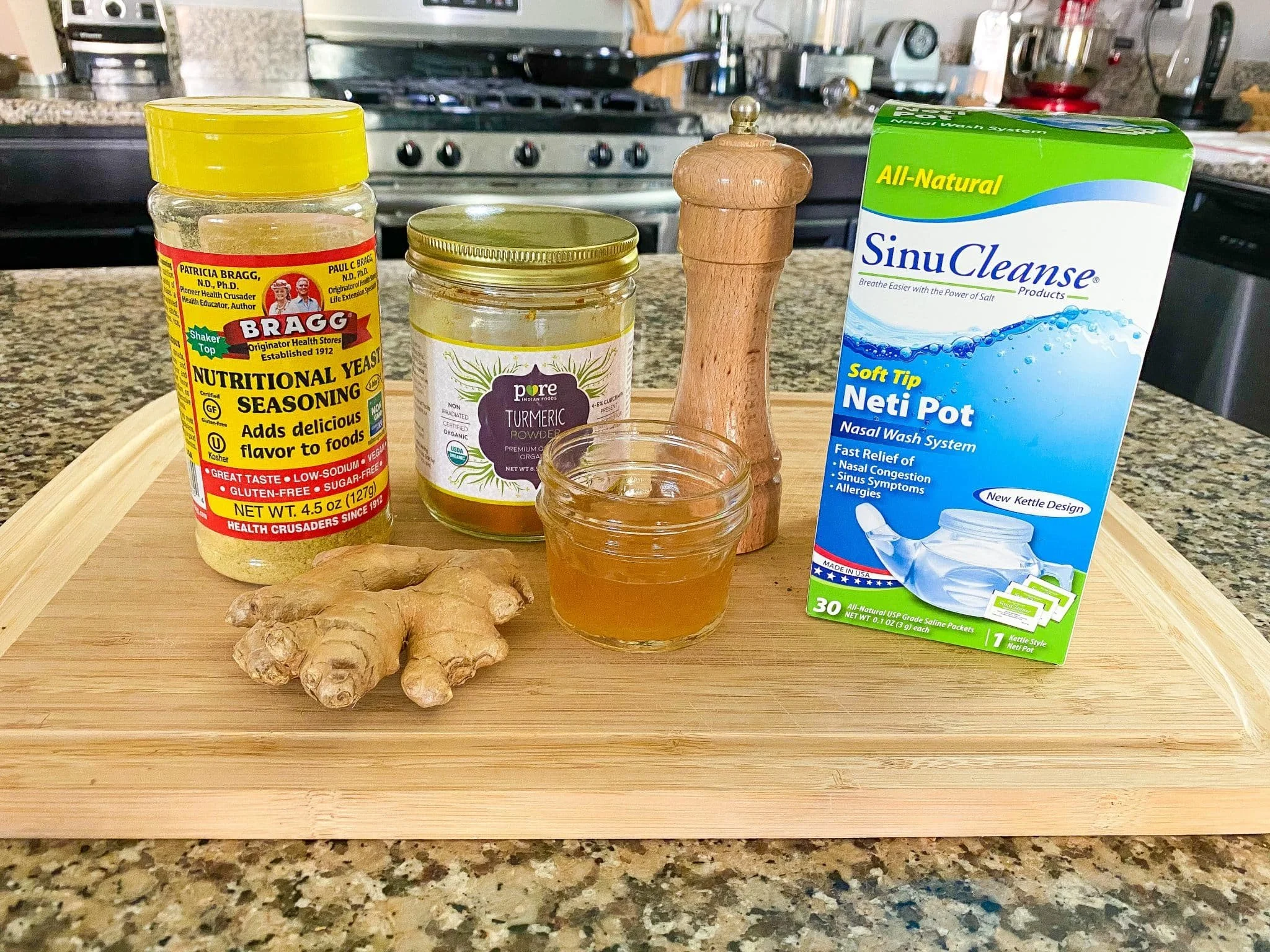From Sneezes to Serenity: Natural Remedies for Hay Fever Management
Discover > Texas Mom Blog > From Sneezes to Serenity: Natural Remedies for Hay Fever Management
Exploring Natural Remedies for Hay Fever
In our search for natural remedies, hay fever has become a prevalent concern for individuals worldwide. This common seasonal allergy, also known as allergic rhinitis, brings forth a range of distressing symptoms, including sneezing, a runny or congested nose, itchy and watery eyes, and an overall sense of discomfort. However, amidst the challenges posed by hay fever, a multitude of natural remedies have emerged to offer relief and effective symptom management. These natural approaches are designed to not only ease the immediate discomfort but also address the underlying root causes of hay fever, bolstering the body's immune response. By welcoming these gentle and holistic alternatives to traditional medications, individuals can navigate their hay fever journey with a renewed sense of hope and well-being.
Understanding Hay Fever
Hay fever symptoms can vary from person to person but commonly include nasal congestion, sneezing, and itchy eyes. The symptoms are triggered by the body's immune system reacting to allergens, such as pollen, which it mistakenly identifies as harmful invaders. The immune system releases histamines and other chemicals to protect the body, leading to classic hay fever symptoms. Understanding these triggers and symptoms is essential in finding the most effective natural remedies for relief.
Recognizing the Symptoms of Hay Fever
Recognizing hay fever symptoms is crucial for timely intervention and relief. Common signs include persistent sneezing, a runny or stuffy nose, itching and redness in the eyes, and sometimes fatigue and headaches. These signs and symptoms typically manifest in the spring and autumn, when allergens are at their peak. If people are aware of their indicators early on, they can look into alternative treatments to lessen their suffering.
The Science Behind Hay Fever
Hay fever is an allergic reaction caused by the immune system's response to allergens. When the body comes into contact with pollen or other airborne allergens, the immune system identifies them as threats and produces antibodies, specifically immunoglobulin E (IgE). These antibodies then trigger the release of histamines and other inflammatory substances, leading to the symptoms of hay fever. By having a firm grasp on this immunological reaction, individuals with hay fever will be better equipped to make educated judgments regarding the natural therapies available to them.
Combatting Hay Fever Naturally
Explore natural remedies to combat hay fever and alleviate its symptoms effectively. Discover holistic approaches that can provide relief from seasonal allergies and help you manage hay fever naturally.
Harnessing the Power of Natural Remedies
A range of natural remedies can help relieve hay fever symptoms and provide relief. Herbal remedies, in particular, have shown promise in reducing nasal congestion and sneezing. Butterbur, elderflower, and quercetin are herbal options known for their anti-inflammatory and antihistamine properties. These herbs can be consumed as supplements or incorporated into teas and tinctures for relief.
Strengthening the Immune System
Strengthening the immune system is vital for minimizing the impact of hay fever. A balanced diet rich in vitamins and minerals, especially vitamin C and antioxidants, can support the immune system. Maintaining a healthy lifestyle, regular exercise, and managing stress can contribute to a robust immune response and potentially ease hay fever symptoms.
Effective Natural Remedies for Hay Fever
It's frustrating to deal with the symptoms of hay fever, but some natural therapies can help. The symptoms of hay fever, such as a runny nose, sneezing, and itchy eyes, can be eased with the help of these remedies.
Relieve Hay Fever Symptoms with Herbal Remedies
Find out how herbal remedies can be a natural and effective solution for relieving hay fever symptoms. Discover the power of natural hay fever remedies in combating nasal congestion, sneezing, and other discomforts caused by seasonal allergies.
Butterbur
Herbal remedies have long been used to reduce hay fever symptoms. One such remedy is Butterbur. Butterbur is a plant that has shown promising results in reducing nasal congestion and sneezing associated with hay fever. It is available in the form of standardized extracts, ensuring its safety and effectiveness.
Elderflower
Another herbal remedy that can provide relief is Elderflower. Elderflower is known for its anti-inflammatory properties and can help reduce hay fever symptoms, particularly congestion and sinus inflammation. It can be consumed as tea or taken in the form of extracts or capsules.
Quercetin
Quercetin, a natural plant pigment found in various fruits and vegetables, is also effective in relieving hay fever symptoms. Quercetin acts as a natural antihistamine, reducing the release of histamines in the body and helping to alleviate allergic reactions. Incorporating quercetin-rich foods such as apples, onions, and berries into your diet can relieve natural hay fever.
Soothing Itchy Eyes with Natural Treatments
Learn about natural remedies for relieving hay fever-related eye irritation. Look into mild and natural treatments for seasonal allergy-related eye inflammation and discomfort.
Cold Compresses
Itchy eyes are a common and bothersome symptom of hay fever. Fortunately, natural treatments can help soothe and relieve this discomfort. One such treatment is cold compresses. Applying a cold compress to the eyes can provide temporary relief from itchiness and reduce inflammation. Simply place a clean, damp cloth or cold gel pack over closed eyes for a few minutes for soothing relief.
Eyebright
Another natural remedy for itchy eyes is Eyebright. Eyebright is an herb that has been traditionally used to treat eye conditions. It can be used as an eyewash or taken orally as a supplement. Eyebright helps reduce eye inflammation, redness, and itchiness, providing much-needed relief to hay fever sufferers.
Unblocking Nasal Passages for Better Breathing
During hay fever season, it can be helpful to learn some natural methods of clearing up your nasal passages and breathing more easily. If you're looking for a natural way to deal with nasal congestion and discomfort, try out some techniques like saline nasal rinses and steam inhalation.
Saline Nasal Rinse
Nasal congestion is a common and bothersome symptom of hay fever. To unblock nasal passages and improve breathing, natural remedies can be used. One effective method is saline nasal rinse. A saline solution can be used to rinse the nasal passages, helping to flush out allergens, reduce inflammation, and relieve congestion. This can be done using a neti pot, squeeze bottle, or nasal spray designed explicitly for saline rinses.
Steam Inhalation
Steam inhalation is another natural remedy that can help unblock nasal passages. Inhaling steam from a bowl of hot water or using a humidifier can moisturize the nasal passages and provide temporary relief from congestion. Adding a few drops of essential oils, such as eucalyptus or peppermint, can enhance the decongestant effect.
The Role of Natural Antihistamines in Hay Fever Relief
Understand the importance of natural antihistamines in providing relief from hay fever symptoms. Discover how these natural remedies can help reduce sneezing, itching, and other allergy indicators, allowing you to find relief from hay fever discomfort.
Bromelain
The use of natural antihistamines is becoming increasingly important in the treatment of hay fever. Bromelain, found in pineapples, is one such antihistamine found in nature. Bromelain has anti-inflammatory properties and can reduce nasal swelling and congestion associated with hay fever. It is available in supplement form and should be taken as directed.
Stinging Nettle
Stinging Nettle is another natural antihistamine that can help alleviate hay fever symptoms. Nettle leaf extract acts as a natural antihistamine and can reduce the release of histamines in the body. It is available in various forms, including teas, capsules, and tinctures, and can provide relief from sneezing, itching, and congestion.
Living with Hay Fever
Living with hay fever can be challenging, especially when allergy indicators like a sore throat become bothersome. However, several lifestyle tips and preventive measures can help relieve symptoms and minimize the impact of seasonal allergies. By incorporating these strategies into your daily routine, you can take control of your hay fever and enjoy a better quality of life during allergy seasons.
Managing Hay Fever Triggers in Your Environment
Identifying and reducing exposure to hay fever triggers in your immediate environment can significantly improve symptoms. Keeping windows closed during peak pollen seasons, using air purifiers indoors, and regularly cleaning and dusting can help minimize exposure to allergens. Additionally, wearing sunglasses and a hat outside can prevent pollen from coming into contact with your eyes and hair.
Natural Ways to Ease Seasonal Allergy Symptoms
Incorporating certain lifestyle practices can provide relief from seasonal allergy symptoms. Practicing good hygiene, such as washing hands and face regularly, can remove allergens from the body. Additionally, staying hydrated, getting adequate rest, and maintaining a healthy diet can support overall immune health and potentially reduce the severity of hay fever symptoms.
Empowering Individuals in Symptom Management
In the quest for relief from hay fever symptoms, natural remedies offer diverse options that can help individuals find solace while reducing reliance on traditional medications. By understanding the triggers, symptoms, and immune responses associated with hay fever, individuals are empowered to make informed decisions about incorporating natural remedies into their treatment approach.
The availability of natural remedies for hay fever provides an opportunity to address the root cause of symptoms and promote overall well-being. From herbal remedies to soothe itchy eyes to techniques that unblock nasal passages for better breathing, these holistic approaches offer a gentle and alternative path toward soothing hay fever discomfort.
While exploring natural remedies, it is important to seek guidance from healthcare professionals or allergists who can provide personalized advice and recommendations based on individual needs and ailment indications. Their expertise can help individuals navigate the vast range of natural remedies available and tailor a treatment plan that optimally manages hay fever symptoms.
By embracing natural remedies for hay fever, individuals can take control of their symptom management journey and strive for a balanced and healthy lifestyle. With a commitment to understanding the underlying mechanisms of hay fever and a willingness to explore natural alternatives, individuals can experience relief from symptoms while prioritizing their overall well-being.






